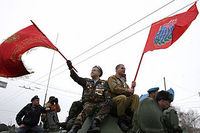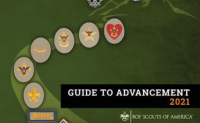 For the past eleven-plus years, the United States military has been engaged in warfare in the mountainous Asian nation of Afghanistan, assisting the Afghan forces in defending against the Taliban. Politics aside, many observers have been looking forward to an end to US involvement. Chiefly among them are families of our fighting men and women, many of whom were Scouts as youth.
For the past eleven-plus years, the United States military has been engaged in warfare in the mountainous Asian nation of Afghanistan, assisting the Afghan forces in defending against the Taliban. Politics aside, many observers have been looking forward to an end to US involvement. Chiefly among them are families of our fighting men and women, many of whom were Scouts as youth.
Within the last few days, President Obama announced his intention to pursue an accelerated withdrawal of fighting forces from Afghanistan. No longer would American troops be fighting the battles; rather, most will come home, and for those who remain, their role will be one of training, advising and assisting Afghan forces as they engage in combat against their country’s insurgents.
“Training, advising and assisting.” Sound familiar?
On occasion, some of us compare dealing with rambunctious boys to warfare, but all joking aside, those three words pretty well define the adult role in Boy Scouting. We don’t draw up the battle plans, take the field, or fire the cannons. What we do is similar to our military’s new role in Afghanistan:Â train the boys in the skills they need to plan and conduct their program; advise them on wise and appropriate choices and methods; and assist them with those things that they cannot do for themselves.
Training includes the formal classroom and teambuilding experiences such as Introduction to Leadership Skills for Troops, which the BSA provides for us to give our youth leaders an orientation to troop structure, operations and leadership. More importantly, training involves the day-to-day, week-to-week interaction between the Scoutmaster and senior patrol leader and between the assistant Scoutmasters and other youth leaders. This ongoing behind-the-scenes youth leader development is the heart of our training mission.
Not content to just turn them loose after a half-day of formal training, it’s up to the troop’s adult leaders to guide the youth into making the decisions and carrying them out. This advisory role is done in the background. It doesn’t mean that you are the puppeteer, manipulating your senior patrol leader as if he were a marionette. You train them, trust them, and let them lead — otherwise, the boys aren’t going to learn, and you’ll still be running the troop.
In a properly youth-led troop, the adults assist the boys – not the other way around. We don’t teach skills, cook their meals, make out duty rosters, plan troop meetings or issue equipment. Those are the jobs of the youth leaders – the patrol leaders’ council, scribe, quartermaster, grubmaster, chaplain aide, instructor – you get the idea. We can assist, as requested, by driving them to the store or to campouts, by providing a meeting place, by buying them tents (with the money they raise, of course!). If our troop was a business, the parents, and society at large, would be our customers, and instilling the values in young people is our product - not going camping and having troop meetings!
The US military will be following the advice, paraphrased, of the war hero of an earlier century: “Never do anything an Afghan soldier can do.” We still follow Baden-Powell’s advice today.
Image courtesy Wikimedia Commons
This post first appeared on Bobwhite Blather.



